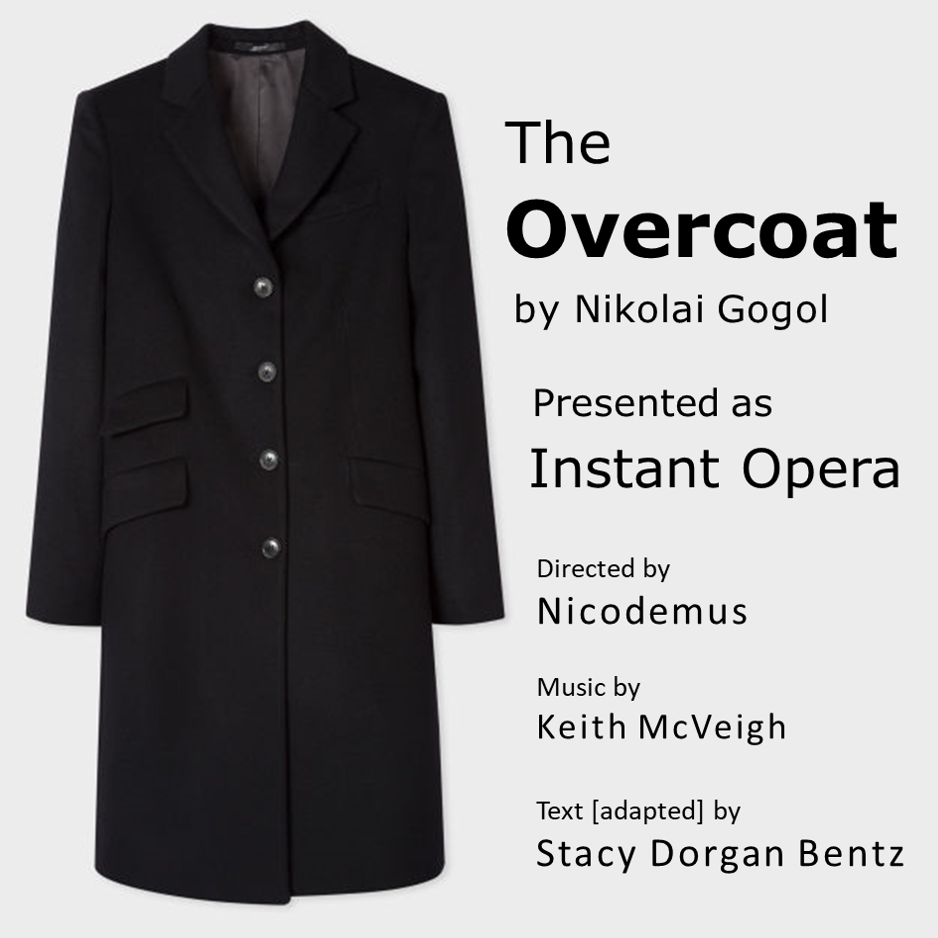The Overcoat
|
The Overcoat is a new one-act, possibly spoken, jazz opera based on Nikolai Gogol’s 1842 short story, which will be presented as our first ever instant opera in 2024. The opera is currently being adapted by Stacy Dorgan Bentz and Nicodemus (dramaturgy) and will be directed by Nicodemus with music by Keith McVeigh.
|
Synopsis
Akaky Akakievich Bashmachkin plods between his work as a low-level bureaucrat and his humble reclusive life in urban St Petersburg. He is an excellent clerk, reliable and precise, but not adept in the norms and mores necessary for social and professional mobility. Indeed Akaky is extremely socially awkward, but he’s not the dull character of his outer appearance. Like a chameleon that camouflages to avoid becoming prey, Akaky instinctively masks his identity to obscure its striking contrast with the drab society in which he lives.
Thus unmasked our hero may have remained had he not desperately been in need of a new coat. If there’s anything worse than the darkness of the St Petersburg winter, it’s its cold. Akaky’s well-worn coat has become threadbare and tattered and no longer functionally serves its purpose well, so he sets off pragmatically, to have the coat repaired and perhaps even relined.
Akaky appreciates the durability, longevity and warmth of fine material, but he also secretly loves beautiful things. He reasons that there is prudence to investing in a new coat, and perhaps he’ll even select some colour for the lining. It is, after all, on the inside of the coat. The fabric samples are glorious. To design something of such style, for which small touches add not only to its elegance and singularity but also to its functionality, is pure joy. Akaky’s wily tailor, who carries flamboyance with grace and style, eagerly accepts, indeed nurtures, our unwitting Akaky’s increasing exuberance.
What Akaky and the tailor bring forth is nothing short of a work of art. But it is also a signifier, the uniform of a certain class, a ticket that opens doors. And more: the coat seems to have a power of its own, through an affinity with high society, and draws its wearer forth, into the light. Our Akaky relishes the warmth, colour and vitality of the society he’s brought into and its acknowledgement and embrace.
But even as it covers him and protects him from the elements, the coat uncloaks him. He no longer blends in with background grey of the cityscape in which he resides. In the new world of colour and light he is equally exposed. There is an unconscious order to this new world, for which Akaky lacks the proper perception. The choreographed and practiced constellations of expression and gesture: the degree of smile, subtle wink and slant of brow; the tone of voice, turn of phrase, flourish of hand and placement of feet. Woe the nuanced juxtaposition of shoulder, torso and hip! Like a chick pecked to death by his fellow hatchlings (but he looks so healthy, he looks “normal”!), Akaky has arrived but clearly doesn’t belong. There is surprise and mirth. His colleague’s merriment is infectious. Laughing along his identity bubbles all the more vibrantly to the surface. His innermost, authentic self truly lives, and he has a fleeting taste for what it is to be fully realized. Perhaps this is how a moth feels flying so close to a flame, before its sudden death.
But is this really the last of Akaky St Petersburg society will experience, or is there now something capable of living on, if not in light then in shadow?

